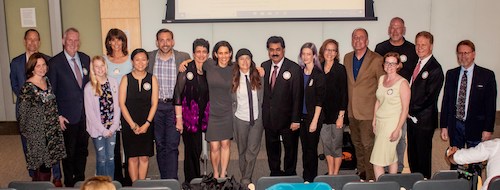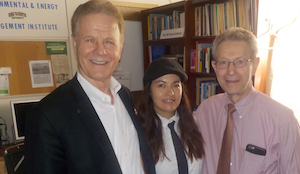The Environmental and Energy Management Institute conducted a Forum entitled “Tackling the Population Taboo: Creating a Sustainable Future for Our Children” in the Lehman Auditorium on April 9, 2019. EMSE Professor Jonathan Deason kicked off the event with a welcoming address. EMSE Research Professor Joe Cascio was instrumental in organizing the event, which was attended by a number of GW students.
The Forum addressed the problem of human population growth, which at 7.7 billion people has become the primary driver of environmental problems such as global climate change and species extinction. Eighteen speakers discussed potential positive and achievable and solutions to this worldwide issue at the Forum.
The world’s human population reached one billion in 1804. We’ve added our most recent billion in only 12 years. Our numbers have doubled since 1972. We’ll surpass 7.7 billion this year and are projected to reach at least 11 billion by 2100. Yet the topic of human population is often considered taboo, if considered at all. There is fear that any discussion is a slippery slope for human rights violations, while temporal myopia hampers engagement.Our Symposium discussed positive, achievable, and inclusive solutions to the greatest driver of environmental impact (including climate change and species extinction) and inequality: unsustainable human growth. Population is a complicated and uncomfortable subject that implicates other complicated and uncomfortable subjects, such as personal freedoms, birth control, abortion, adoption, religion, immigration, ethnicity, race, and national, cultural, and wealth differences.
There are minefields aplenty. But the costs of inaction are far higher. The increasing impacts of climate change and unequal opportunities will disproportionately affect the poor, those least responsible, and those least able to adapt to changing conditions.
|
Conference Speakers |
Speakers at the Symposium were:
Travis Rieder, PhD, Johns Hopkins Berman Institute of Bioethics. Travis Rieder, PhD, is the Assistant Director for Education Initiatives, Director of the Master of Bioethics degree program and Research Scholar at the Berman Institute of Bioethics. He is also a Faculty Affiliate at the Center for Public Health Advocacy within the Johns Hopkins School of Public Health.
Ashley Berke, Director of Communications, Having Kids. At Having Kids, Ashley is developing campaigns to spark a national discussion on the connection between our family planning choices and our impact on the world. She has previously worked with Ethical Choices Program and Animal Recovery Mission, in partnership with the Sustainability program at Florida Tech where she led the effort to make the Florida Marathon one of the greenest endurance events in the nation, and is currently advising Communications and Development for OneProtest, where she serves as a board member as well. She also is on the board of Space Coast Animal Rights. Ashley is driven by the urgency to enact high-level change for the sake of all of our planet’s inhabitants.
Sarah Bexell, PhD, Clinical Associate Professor, University of Denver & Community Connections Associate, Having Kids. Sarah Bexell is Clinical Associate Professor in the Graduate School of Social Work and Director of Humane Education in the Institute for Human-Animal Connection, both at the University of Denver. She is also Senior Advisor to the Chengdu Research Base of Giant Panda Breeding and faculty member of the Institute for Humane Education-Valparaiso University where she teaches Animal Protection. At the University of Denver she teaches in the areas of sustainable development, animal studies and humane education. She serves as Community Connections Associate with Having Kids, Inc. Her interests and work in human population issues stem from concern for human rights, animal protection and environmental preservation.
N. Kate Cho, MHS, Senior Program Officer, The Challenge Initiative at the Bill & Melinda Gates Institute for Reproductive Health. N. Kate Cho is an international public health specialist with over 15 years working on family planning and reproductive health issues in low-income countries. Her interest in population issues began with the popular course “Global Problems of Population Growth” at Yale University. Better known by its alternative title “Monkey Sex,” what was simply a way to take a fun class with friends auspiciously changed the trajectory of her life. After graduation, she began her career working for a small NGO that produced radio soap operas in Ethiopia and Mali that told dramatic stories about the negative impacts of high fertility and rapid population growth on health, economic growth, social cohesion, and the environment. Since then, she has worked in or supported family planning programs in 13 countries to reduce undesired pregnancies and meet the growing demand for contraception. She currently serves as Senior Program Officer for Advocacy and Accountability at The Challenge Initiative, an urban family planning program housed at the Bill & Melinda Gates Institute for Reproductive Health at Johns Hopkins University. She has worked on several presidential campaigns in the U.S. and sits on the Program Advisory Board for Population Media Center.
Brian Czech, PhD, Executive Director, Center for the Advancement of the Steady State Economy (CASSE). Brian Czech served as a conservation biologist in the headquarters of the U.S. Fish and Wildlife Service from 1999-2017 and as a visiting professor of natural resources economics with Virginia Tech through most of that period. He is the author of three books: Supply Shock, Shoveling Fuel for a Runaway Train, and The Endangered Species Act: History, Conservation Biology, and Public Policy. He has published over 50 academic journal articles in more than 20 peer-reviewed journals. Czech is a frequent speaker, commentator, and a regular contributor to the Steady State Herald, CASSE’s blog. He has a B.S. from the University of Wisconsin, an M.S. from the University of Washington, and a Ph.D. from the University of Arizona. https://steadystate.org/
Abdul Malik Ghauri, Population Planning Advocate and Former Magistrate & Senior Civil Officer of Pakistan. Abdul Malik Ghauri, a staunch advocate for population planning, hails from Pakistan, where he served as Magistrate & Senior Civil Officer in the government. He has been the top position holder in the General Competitive Examination held by the Public Service Commission, and he has a Masters in English & Law. His research and observations have led him to conclude that overpopulation is the fundamental threat to all of us, with population growth linked to armed conflicts, civil wars, cruelty against animals, environmental degradation, human trafficking, and heinous crimes. He advocates for contraception. He also encourages engagement with China, a country that has directly addressed its crisis-level population problems, to learn more about the reasons for the one-child policy, and the impacts, successes, and mistakes of the policy and its implementation.
|
Professors Deason and Cascio with Race Car Driver Leilani Munter |
Münter, Race Car Driver and Environmental Activist. Leilani Münter is a biology graduate, race car driver and environmental activist. Discovery’s Planet Green named her the #1 eco athlete in the world, ELLE Magazine awarded her their Genius Award, and Sports. Leilani’s motto is: never underestimate a vegan hippie chick with a race car.Illustrated named her one of the top ten female race car drivers in the world. Leilani sits on the Board of the Oceanic Preservation Society and was featured in their Emmy-nominated documentary film Racing Extinction. Leilani is vegan, her personal car is an electric Tesla Model S which she charges with solar power. (http://leilani.green)
Alexandra Paul, Actress and Population Activist. Alexandra Paul is a longtime population activist. She co-wrote and produced the educational film Jampacked on human overpopulation, and a sequel on overconsumption, The Cost of Cool. She has spoken to 6,000 Los Angeles schoolkids on this topic, and in 1997 the United Nations Population Fund honored her for her work. In 2005, the ACLU of Southern California named her Activist of the Year. In 2012, she spoke at TEDx Topanga on the benefits of the one-child family and traveled to Sierra Leone to volunteer for Population Media Center. She is on the board of advisors of World Population Balance and hosted 150 episodes of the environmental talk show, EarthTalk Today. Alexandra presented on the human overpopulation issue at the 2017 and 2018 National Animal Rights Conferences. Alexandra is also an actress living in Los Angeles, who has appeared in over 100 movies and television shows, including starring for 5 years on the television series Baywatch.
Willow Phelps, Age 11, Suing Federal Government Over Climate Change. Willow Phelps is dedicated to being a steward for animals and the environment. She is part of the lawsuit which aims to ensure that the government protects the environment for the benefit of animals, thus making laws that are more protective of humans. Named ASPCA Kid of the Year in 2016, Willow has raised nearly $17,000 for organizations that help both animals and people by making cat toys, running 5K’s and swimming a one-mile lake every summer on her birthday. Willow has participated in Girls in Politics in Washington DC, campaigning for a Senate seat on the issues of climate change and factory farming.
David R. Rain, PhD, Associate Professor of Geography and International Affairs, The George Washington University. David Rain is Associate Professor of Geography and International Affairs at the George Washington University. He joined the full-time faculty in 2004, and he was Director of the undergraduate Environmental Studies program from 2009-18. He received his Ph.D. in Geography with a minor in Demography from Penn State in 1997. Prior to his appointment at GW, he was as a statistician-demographer with the Population Division of the U.S. Census Bureau. He has consulted with the United Nations and the World Bank on geospatial infrastructure for social statistics, and his research interests embrace cities in the developing world and the environmental and health dimensions of urbanization. He has led NIH-funded fieldwork in Ghana documenting the effects of urbanization on health and disaster vulnerability. Professor Rain has served on the Geographical Sciences Committee of the National Research Council, and has taught courses on the Geography of Africa, Cities in the Developing World, History of Geographic Thought, Society and Environment, People, Land, and Food.
Dr. Karen I. Shragg, Naturalist and Children’s Book Author. Dr. Karen I. Shragg has a long-established career as a naturalist, nature center director, author and poet. Her love of teaching, writing, and the precarious situation we find ourselves in this frightening Anthropocene inspired her to become an overpopulation activist, and she has been affiliated with World Population Balance, an NGO, for many years. She has written 14 books for children and adults. Her book, Move Upstream A Call to Solve Overpopulation ( 2015 Freethought House Press) has created opportunities for her to speak about overpopulation in the midwest (where she is from), California, England, and China. With her co-author Lee Ann Landstrom, she wrote a children’s book series, Nature’s Yucky Gross Stuff that helps nature work, which has become a popular series from Mountain Press. Karen’s passion for wildlife, and her understanding of how too many humans impact the earth’s fragile ecosystems, motivate her to speak out about the one issue so many environmental groups sweep under the rug.
Terry Spahr, Executive Director, Earth Overshoot; Producer, 8 Billion Angels. A graduate of the University of Pennsylvania’s College of Arts & Sciences and Fels Center of Government, Terry Spahr built a 25-year career in the insurance, investment, and real estate industries. In 2016, Terry left the corporate world to work in environmental advocacy and social justice by researching, writing, and producing 8 Billion Angels, a documentary feature exploring the impact of humanity’s growing numbers on planet Earth. The film details mankind’s rapid ascent across the globe and the inextricable links between population and our ever-increasing food, water, climate, pollution and extinction emergencies. Unlike other environmental documentaries, the film proposes real solutions to bring about a sustainable future. Most recently, Terry established Earth Overshoot, a non-profit designed to promote public and private action to make ecological limits central to all decision-making.
Chris Weiss, Executive Director, DC Environmental Network & Director of Global Green’s DC Office. Chris Weiss has been the Executive Director of the DC Environmental Network (DCEN) since 2002. DCEN was founded by 11 environmental organizations and foundations, including Friends of the Earth, Institute for Local Self-Reliance, Sierra Club (Washington, DC Chaper), and other DC focused advocates. DCEN has a vision of rebuilding Washington, DC’s neighborhoods and communities for long-term economic stability — accomplishing this by protecting and restoring the Capital City’s urban environment. With Chris as its Executive Director, DCEN is now a thriving coalition of organizations and advocates focusing shared resources on sustainability challenges. DCEN helps lead campaigns addressing major environmental problems in the region, including global warming, contaminated drinking water, air pollution, congested traffic, neighborhood trash, degradation of the Anacostia River, and lead contamination. DCEN recently helped lead a successful campaign to create the strongest greenhouse gas reduction targets in the country.
Tommy Wells, Director of the District of Columbia Department of Energy & Environment. Tommy Wells is chiefly responsible for protecting the environment and conserving the natural resources of the District of Columbia. Tommy’s team is comprised of approximately 300 environmental professionals collectively working to improve the quality of life for residents and the natural inhabitants of the Nation’s Capital. Most recently, Tommy served as the DC Councilmember representing Ward 6—a position he held since 2006. During his time on Council, he garnered broad support for his efforts to make the District livable and walkable for all. Tommy worked with the City’s leadership and, in particular, residents of Ward 6 to create a shared and respected place where drivers, cyclists, pedestrians, and exercise enthusiasts can co-exist safely. Read the full biography.
Jonathan P. Deason, PhD, Professor, The George Washington University. Jonathan Deason has served as the Director of the Environmental and Energy Management Program in the School of Engineering and Applied Science at the George Washington University since 1996. He previously was Director of the Office of Environmental Policy and Compliance at the U.S. Department of the Interior, where he managed nine regional offices across the nation and seven staff divisions in Washington, D.C. Jon holds a Ph.D. in environmental systems from the University of Virginia, an M.S. in environmental engineering from the Johns Hopkins University, an M.B.A. in management from the Golden Gate University in San Francisco, and a B.S. in engineering from the U.S. Military Academy. He
was the facilitator of the Renewable Natural Resources Foundation’s “Congress on Human Population Growth: Impacts on the Sustainability of Renewable Natural Resources” that occurred at the George Washington University during the period September 16-19, 1998.
Erika Mathews, Executive Director, Having Kids. Erika Mathews has dedicated her career to animal welfare and the environment through fundraising and hands-on animal care and rescue. She holds a bachelor’s degree in English/Journalism and German from Rutgers University and brings 20 years of experience working for animal protection organizations, including the St. Hubert’s Animal Welfare Center, Nonhuman Rights Project, Farm Sanctuary, the Animal Legal Defense Fund and the American Society for the Prevention of Cruelty to Animals.
Dr. Tara Scully, Director of the Sustainability Minor Program and Assistant Professor of Biology, The George Washington University. At GW, Dr. Scully teaches introductory biology and sustainability courses and laboratories to non-science majors. Currently, she teaches five different courses: Introduction to Sustainability; The Biology of Nutrition and Health; The Ecology and Evolution of Organisms; Food, Nutrition, and Service; and Understanding Organisms through Service Learning. Dr. Scully received her MS, specializing in forensic science research with a concentration on fiber evidence and a PhD with a research focus on developmental biology from The George Washington University. She has authored many research articles along with the book: Discovering Biology in the Lab: An Introductory Laboratory Manual as well as Why We Eat Food. Dr. Scully works with many different DMV area community partners on topics ranging from nutrition to invasive species.
Maureen Cohen Harrington, Forum Organizer, Moderator. Maureen Cohen Harrington is Special Projects Manager at Having Kids. In 2017, she organized and moderated the first-ever panel about human overpopulation to be held at the Animal Rights National Conference, the world’s largest and longest-running animal rights gathering. She is vice president of the Congressional Vegetarian Staff Association, member of the Committee of 100 on the Federal City, on the board of Washington Area Lawyers for the Arts, and vice president of Washington Area Roadskaters. In her day job, she is Senior Counsel at the Library of Congress Office of the General Counsel. She shares a home with two feline Louisiana flood refugees.




